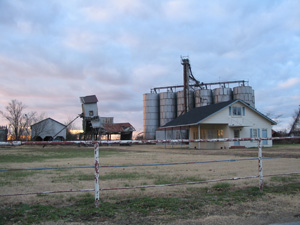
Cotton Gins
Without the cotton gin Tennessee never would have evolved into a major antebellum cotton market; the cotton fibers produced here were too short for hand ginning or roller ginning, which could be performed on the long-staple cotton found along the southeastern coasts. Eli Whitney developed and patented the first cotton gin for separating short-staple cotton from the seeds in 1793. Three years later H. Ogden Holmes patented the more efficient saw gin. All early gins in Tennessee were of the saw gin type. The first gin in West Tennessee, the state’s major cotton producing region in both the nineteenth and twentieth centuries, was at Jackson in 1821. Seven years later both Jackson and Brownsville had operating gins.
Throughout the nineteenth century most planters operated their own gins, which were usually housed in a two-story building that included a storage bin, saw gin, and lint room. Outside stood a wooden screw press that turned the processed cotton into huge bales ready for shipping. Independent gin operators, who usually managed a general store and feed and seed business in addition to the gin, slowly put the plantation gins out of business, however. By 1902 Tennessee had 833 cotton gins; in 1938 only one plantation gin remained. But that same pattern of consolidation eventually closed most independent gin operators as well; by 1958, for example, only 297 gins were operating in Tennessee. By this time, the rule of King Cotton in the Old South had diminished as western states became the nation’s primary cotton producers.
The type of cotton processed by gins also has changed the modern ginning industry. Machine-picked cotton, compared to the earlier hand-picked cotton of the slave era and later tenant farmer period, demands automatic feeders and powerful dryers as well as expensive machinery for cleaning and extracting. Contemporary gins, typically found adjacent to county seats along major highways in West and southern Middle Tennessee, are complicated industrial complexes rather than the simple machines of the past. According to the National Cotton Council of America based in Memphis, 45 gins were operating in Tennessee in 1997, employing some 1,470 workers and earning $24 million a year.



